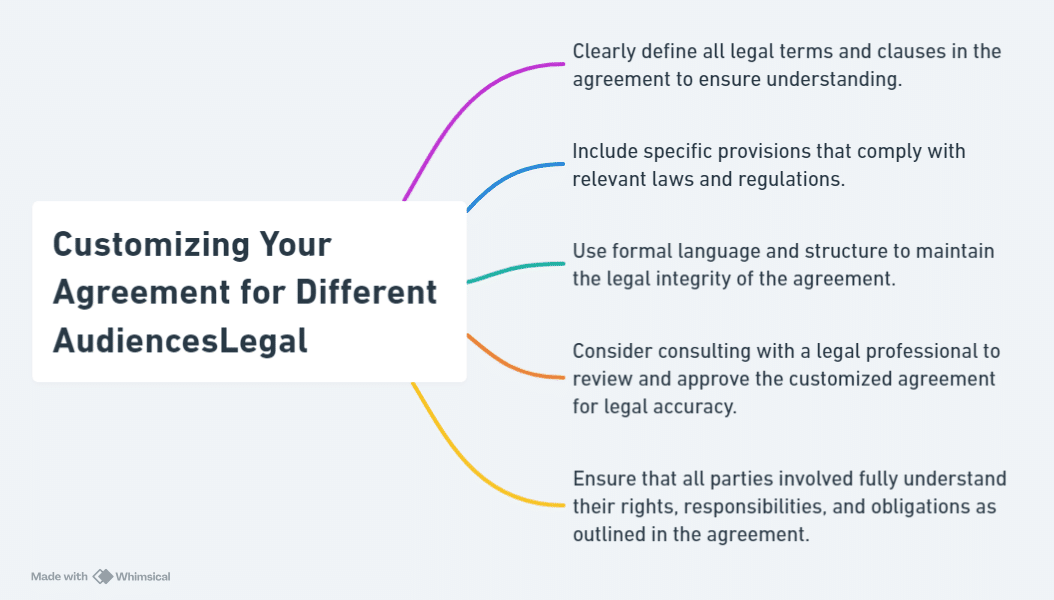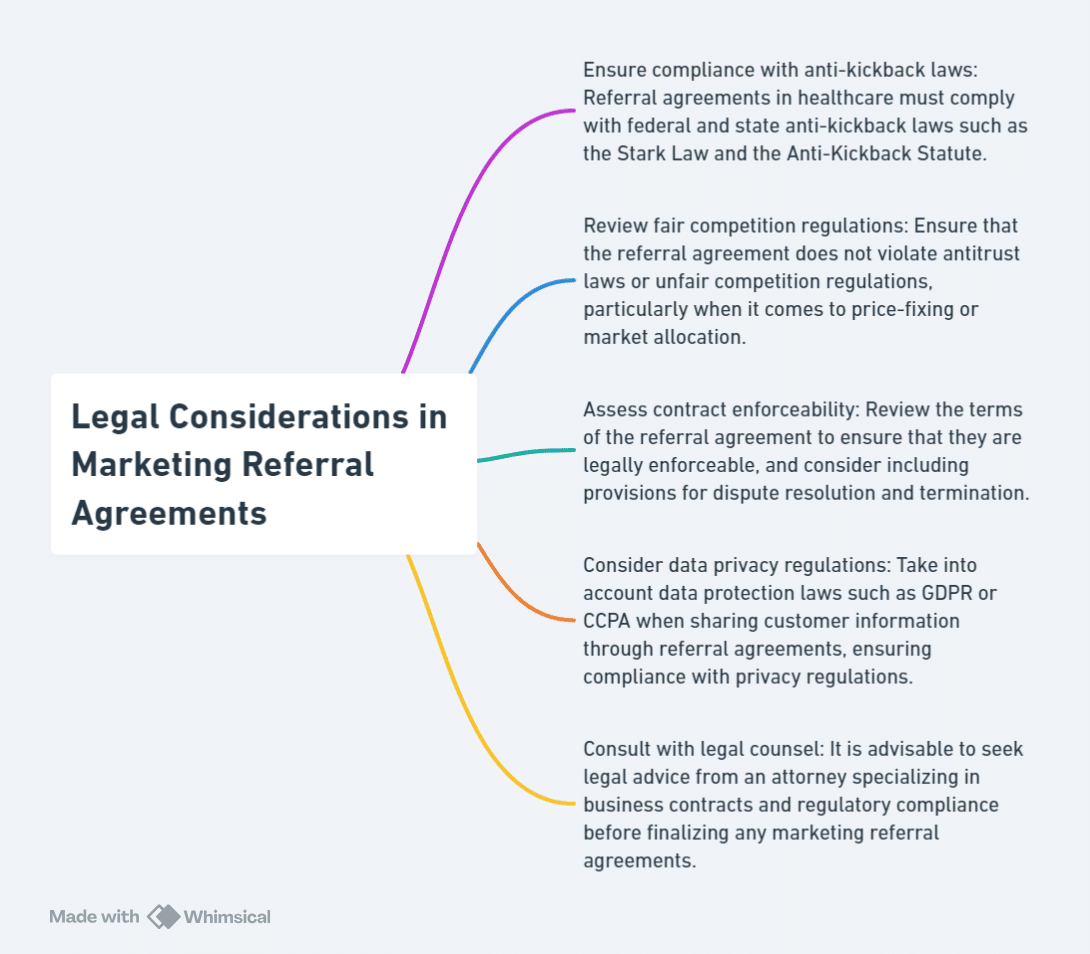Referral marketing can be a powerful way to grow your business, but it’s important to have a solid referral agreement in place to protect your interests and ensure that both parties are clear on the terms of the relationship. Here are a few tips for creating an effective referral agreement:
The Top Tips for Effective Referral Agreements

Marketing referral agreements are essential tools in the arsenal of modern business strategies, leveraging networks to enhance reach and credibility. By understanding and implementing effective strategies for these agreements, companies can significantly boost their marketing efforts. Here are the top tips to ensure your marketing referral agreement is successful and beneficial for all parties involved.
1. Clear Definition of Terms
The foundation of an effective marketing referral agreement is the clarity of its terms. Ensure that the agreement clearly defines what constitutes a referral, the responsibilities of each party, and the specifics of the reward system. This clarity prevents misunderstandings and lays the groundwork for a successful partnership.
2. Transparent Communication
Effective communication is key in any marketing referral agreement. Both parties should have a clear understanding of the agreement’s goals and expectations. Regular check-ins and updates can help maintain alignment and address any issues that may arise, ensuring the partnership remains productive and beneficial.
3. Track and Measure Performance
To gauge the success of your marketing referral agreement, it’s crucial to track and measure performance. Implement systems to track referrals, conversions, and the overall impact of the agreement on your marketing objectives. This data will not only highlight the agreement’s effectiveness but also provide insights for optimization.
4. Offer Attractive Incentives
The effectiveness of a marketing referral agreement often hinges on the attractiveness of the incentives offered. Ensure that the rewards are compelling enough to motivate your partners to actively participate in the referral process. Whether it’s financial compensation, discounts, or exclusive benefits, the right incentives can significantly drive engagement and results.
5. Legal Compliance and Documentation
Ensure that your marketing referral agreement adheres to all relevant legal standards and regulations. Proper documentation and legal review can protect both parties and prevent potential legal issues. This step underscores the professionalism and seriousness of the agreement, fostering trust between partners.
6. Build Strong Relationships
The success of a marketing referral agreement is not just about transactions but also about building strong relationships. Cultivate a positive relationship with your referral partners by providing support, acknowledging their contributions, and treating them as valuable stakeholders in your business. Strong relationships can lead to more effective referrals and long-term partnership benefits.
7. Continuously Improve and Adapt
Finally, view your marketing referral agreement as a dynamic entity. Be open to feedback and willing to make adjustments to improve the agreement’s effectiveness. The market is constantly changing, and so should your approach to referral agreements, ensuring they remain relevant and impactful.
Crafting a Winning Retail Referral Marketing Strategy in 2024
Customizing Your Agreement for Different AudiencesLegal

A marketing referral agreement is not a one-size-fits-all solution; it requires customization to effectively cater to different audiences. Tailoring your agreement to fit the unique needs and preferences of each audience can significantly enhance its effectiveness. Here’s how you can customize your marketing referral agreement for various audiences.
1. Understand Your Audience
Before customizing your agreement, it’s crucial to understand the specific characteristics, needs, and expectations of your audience. Are they businesses or individual consumers? What motivates them? Understanding these aspects can guide you in crafting an agreement that resonates with them.
2. Segment Your Audiences
Divide your broader audience into segments based on relevant criteria such as industry, size, or behavior. This segmentation allows you to create more targeted and relevant referral agreements, which are more likely to be successful.
3. Customize Incentive Structures
Different audiences may value different types of incentives. While some may prefer direct financial rewards, others might find non-monetary incentives like exclusive access or recognition more appealing. Tailor your incentive structures to match the preferences of each audience segment.
4. Adjust Communication Styles
The way you communicate your marketing referral agreement should vary based on your audience. Professional, industry-specific language might work well with business partners, whereas a more casual, relatable tone could be better suited for individual consumers.
5. Flexible Terms and Conditions
Customize the terms and conditions of your agreement to suit the expectations and capabilities of different audiences. For instance, businesses might have the capacity for a higher volume of referrals than individual consumers and might prefer longer-term agreements.
6. Feedback and Adaptation
Incorporate a mechanism for receiving feedback about the referral agreement from different audiences. Use this feedback to make ongoing adjustments, ensuring that the agreement remains relevant and effective for each segment.
7. Legal and Ethical Considerations
Ensure that your customized agreements comply with legal and ethical standards, which may vary depending on the audience and their respective industries or locations. Proper legal review can prevent potential issues down the line.
8. Monitoring and Evaluation
Regularly monitor and evaluate the performance of each customized agreement. This will help you understand what works best for different audiences and make informed decisions about future customization.
Master Referral Marketing Analytics in 5 Steps in 2024
Legal Considerations in Marketing Referral Agreements

Marketing referral agreements are contractual arrangements between two parties, typically a business and an individual or another business, where one party (the referrer) agrees to promote the products or services of the other party (the referral recipient) in exchange for a commission or other compensation. These agreements can be a valuable tool for businesses to expand their reach and generate new customers. However, it is crucial to consider the legal implications before entering into a marketing referral agreement.
Key Legal Considerations
1. Compliance with Antitrust Laws:
Marketing referral agreements must comply with antitrust laws, which prohibit anti-competitive practices. Referrers cannot agree to exclusively promote the referral recipient’s products or services, as this could restrict competition in the market.
2. Disclosure and Transparency:
The marketing referral agreement should clearly disclose the terms of the arrangement, including the amount of compensation, the duration of the agreement, and any restrictions on the referrer’s ability to promote other businesses. This transparency is essential to avoid allegations of deceptive or unfair practices.
3. Indemnification and Liability:
The referral recipient should consider including an indemnification clause in the marketing referral agreement to protect itself from liability arising from the referrer’s actions or representations. The indemnification clause should clearly define the scope of the referrer’s responsibilities and the extent to which the referral recipient will be held harmless.
4. Intellectual Property Rights:
If the marketing referral agreement involves the use of the referral recipient’s intellectual property, such as trademarks or copyrighted materials, the agreement should specify the terms of use and ensure that the referrer has the necessary rights to promote the referral recipient’s products or services.
5. Termination and Dispute Resolution:
The marketing referral agreement should include clear provisions for termination and dispute resolution. The termination clause should specify the circumstances under which the agreement can be terminated and the notice period required. The dispute resolution clause should outline the process for resolving disputes between the parties.
Boost Your Sales: Referral Marketing E-commerce Strategies
Real-World Success Stories: Referral Agreements That Worke
Marketing referral agreements have proven to be a potent tool in the arsenal of many successful businesses. By examining real-world success stories, we can glean valuable insights into how effectively implemented marketing referral agreements can drive growth and foster strong partnerships. Here are some compelling cases where marketing referral agreements have made a significant impact.
1. The Startup Boost: Leveraging Network Effects
A tech startup, aiming to penetrate a saturated market, deployed a marketing referral agreement strategy that rewarded existing users for bringing in new customers. This agreement included not only financial incentives but also access to premium features. The results were astonishing, with a 200% increase in user base within six months. This success story highlights how a well-structured marketing referral agreement can capitalize on network effects, turning users into advocates.
2. The Retail Revolution: Encouraging Customer Advocacy
A retail company transformed its customer base into a marketing powerhouse through a referral agreement. Customers who referred friends and family were rewarded with discounts on future purchases, while the new customers received a first-time purchase discount. This marketing referral agreement not only increased the customer base but also reinforced customer loyalty, doubling the company’s sales within a year.
3. The B2B Success: Building Strategic Alliances
In the B2B sector, a software company utilized a marketing referral agreement to establish partnerships with other businesses. These agreements were tailored to each partner, offering varied incentives based on the volume and quality of referrals. This strategy expanded the company’s reach into new markets and industries, demonstrating the marketing referral agreement’s effectiveness in building and leveraging strategic partnerships.
4. The Non-Profit Win: Expanding Impact Through Referrals
A non-profit organization used a marketing referral agreement to boost its fundraising efforts. By partnering with corporations and offering them recognition in exchange for referrals, the organization saw a significant increase in donations and sponsorships. This approach not only provided the non-profit with essential funds but also expanded its network of supporters, showcasing the versatility of marketing referral agreements across different sectors.
5. The Service Industry Success: Enhancing Client Base and Retention
A service-based company implemented a marketing referral agreement that offered existing clients service upgrades for referring new clients. This not only increased the client base but also improved client retention rates, as the existing clients felt valued and engaged. The success of this marketing referral agreement illustrates how service industries can benefit from referral strategies by focusing on both acquisition and retention.
Referral Marketing Trends: What’s New and What’s Next
Conclusion on marketing referral agreement

